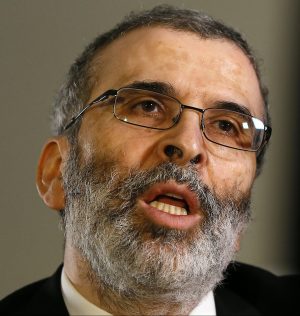By Sami Zaptia.

London, 24 January 2017:
Oil production could reach 1.25 million b/d by the end of 2017 and 1.6 million b/d by 2022, Libya’s National Oil Corporation chairman Mustafa Sanalla told an energy conference in London today.
Sanalla said that NOC-driven projects to expand Libya’s oil production could create ‘‘a virtuous circle of domestic economic stimulus and security’’. To this end, he announced that the NOC plans to allow foreign oil companies to invest again in Libyan oil production.
“We intend in the coming months to lift our self-imposed moratorium since 2011 on foreign investment in new projects to achieve the best national interest for the Libyan oil sector and for Libya as a state.”, he confirmed.
Sanalla said that after three years of blockades by the Petroleum Facilities Guards, all major oil export routes were now open. He added that investment in oil production capacity was needed to build on the opportunity created after the central Petroleum Facilities Guards under Ibrahim Jadhran were removed from the ports of the Oil Crescent by the Libyan National Army in September, and flows from the Sharara field were unblocked.
The NOC chairman has been urging the Tripoli government to allocate a larger budget that is urgently needed to maintain the country’s oil facilities which had suffered years of neglect and war damage. His corporation was allocated a share of LD 4 billion with the electricity sector in the 2017 budget, thought to be less than the $ 2.5 bn he had requested.
Sanalla emphasised the interdependence of the three parts of Libya by highlighting the fact that it was in fact Khalifa Hafter’s LNA forces that evicted Jadhran from the eastern oilfields and is currently acting as guards to the oil crescent.
But he also highlighted the fact that all historic oil contracts are paid into the Tripoli-based Central Bank of Libya, aligned with the internationally recognised Serraj GNA in Tripoli, which is backed by a UN Security Council resolution.
“The LNA has its hands on the taps. And the Government of National Accord (GNA) has [UN Security Council resolutions] 2259 and 2278. Each side has one key to the treasure room, but both keys are needed to open the door.”
Adding a point of realism and reflecting the shifting nature of Libyan affairs, the NOC chairman injected caution and urged action. “For the moment the oil is flowing. This can be an important foundation of stability in Libya if we build on it.”
Saying the oil sector had suffered from chronic under-investment, the NOC chairman urged for proactive self-reliance. “We cannot rely on the international community to save us. We don’t know when the transitional period will end. We cannot stand back and do nothing while the state disintegrates.”
He also continued his mantra that his corporation should remain above the polarized Libyan political divisions. “The integrity of the NOC is the best guarantee we have that Libya will be preserved as a unitary state”, he concluded.








